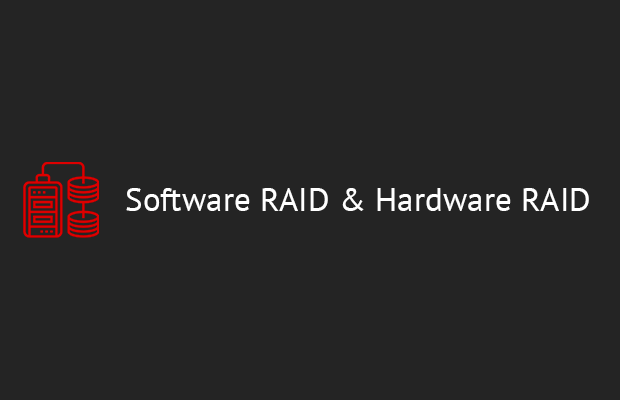Software RAID vs Hardware RAID: Which to Choose

RAID is a redundant array of disks. It is a way to virtualize multiple independent hard drives into one or more arrays to improve performance, capacity, and reliability. RAID can be implemented either with a dedicated controller (Hardware RAID) or with an operating system driver (Software RAID).
Hardware RAID
Benefits:
Hardware RAID is a specialized processing system that uses RAID controllers or cards to manage the RAID configuration regardless of the operating system. The RAID controller does not take processing power from the drives it manages. Thus, more space and speed can be used to read and write data. It can run on any operating system. Replacing a failed drive is very simple - just unplug it and insert a new one.
Disadvantages:
Because hardware RAID requires additional controller hardware, the cost is higher than software RAID. If your RAID controller fails, you need to find a compatible one to replace it for the RAID system to work as you configured it.
Software RAID
Benefits:
Unlike hardware RAID, software RAID uses the processing power of the operating system in which the RAID drives are installed. The cost is lower because no additional hardware RAID controller is required. It also allows users to reconfigure arrays without the constraints of a hardware RAID controller.
Disadvantages:
Software RAID is usually slower than hardware RAID. Since some processing power is consumed by the software, the read and write speed of your RAID configuration, as well as other operations performed on the server, maybe slowed down by it. Software RAID is often operating system dependent, so it generally cannot be used for partitions shared by operating systems. Replacing a failed disk in software RAID is somewhat more complicated. You must first tell your system to stop using the disk and then replace the disk.
Software RAID vs Hardware RAID: Which to Choose
The choice between software RAID and hardware RAID depends on what you need to do and the cost. If your budget is tight and you are using RAID 0 or RAID 1, there won't be much difference between software RAID and hardware RAID. If you are looking for maximum performance with compute-intensive RAID 5 and RAID 6, you should choose hardware RAID, because software RAID can actually degrade performance. Moreover, esoteric RAID levels like RAID 10 are usually not supported by software RAID. In this case, hardware RAID is required. In general, hardware RAID costs more than software RAID, but offers better performance and frees you from the limitations of software RAID, giving you more flexibility in how it is used and in the types of configurations. If your budget allows, hardware RAID is definitely for you. Feel free to email us at [email protected] if you need a dedicated server with hardware RAID. Our specialist will be happy to help.

